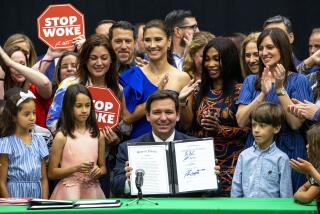Supreme Court, spurred by Trump’s lawyers, could achieve backdoor repeal of workers’ rights laws
The Supreme Court opens its term on Monday with Trump administration lawyers arguing for a pro-business ruling that could bar workers from joining together to challenge the legality of their company’s workplace rules, including on wages and overtime pay.
At issue is whether businesses may require employees to waive their rights to join with coworkers and instead agree to act alone to settle disputes before an arbitrator.
If the high court agrees with the administration, the outcome could sharply restrict the rights of private-sector workers who do not belong to a union.
About 60 million nonunionized workers in the private sector are covered by arbitration agreements that bar them from going to court to sue over alleged violations of federal workplace laws, including civil rights and anti-discrimination measures, according to the Economic Policy Institute, a liberal-leaning group in Washington.
About 25 million of these private-sector workers are also barred from joining class-action or group claims before an arbitrator. The Supreme Court will decide whether the workers can act together or alone. Unionized workers can take collective action through bargaining.
“Very few workers will sue by themselves,” said Catherine K. Ruckelhaus, general counsel for the National Employment Law Project, a worker advocacy group. Doing so “puts a target on their back,” she said, and it may cost more to bring a claim than they could possibly win.
Eliminating joint claims “is a backdoor way of repealing the laws on the books,” Ruckelhaus said.
The Obama administration had insisted that companies could not require workers to waive their rights to sue or to join together before an arbitrator. Its lawyers pointed to the National Labor Relations Act of 1935, a key measure of President Franklin Roosevelt’s New Deal that said workers had a right to join a union and to “engage in other concerted activities” to protect their interests.
Earlier this year, after the justices agreed to rule on the issue, the Trump administration switched sides and joined in support of the employers. Its lawyers cited the Federal Arbitration Act of 1925, which calls for enforcing arbitration agreements.
The three cases being considered on Monday arose from overtime claims from gas station workers in Alabama, technical writers in Wisconsin and accountants in Northern California.
Lower courts have split on the issue. The 7th Circuit Court in Chicago and the 9th Circuit in San Francisco ruled for the employees and said their companies could not bar them from bringing a joint claim. But 5th Circuit in New Orleans ruled for Murphy Oil Co. and said the gas station workers could bring only individual claims for overtime pay.
The arguments will feature a rarity. Two federal government lawyers will argue before the court on opposite sides. A Trump administration lawyer representing the Justice Department will urge the justices to rule for the employers, while a lawyer for the National Labor Relations Board, which is an independent federal agency, will argue for the workers.
The cases are NLRB vs Murphy Oil, Epic Systems vs. Lewis and Ernest & Young vs. Morris.
On Twitter: DavidGSavage
More to Read
Get the L.A. Times Politics newsletter
Deeply reported insights into legislation, politics and policy from Sacramento, Washington and beyond. In your inbox three times per week.
You may occasionally receive promotional content from the Los Angeles Times.







